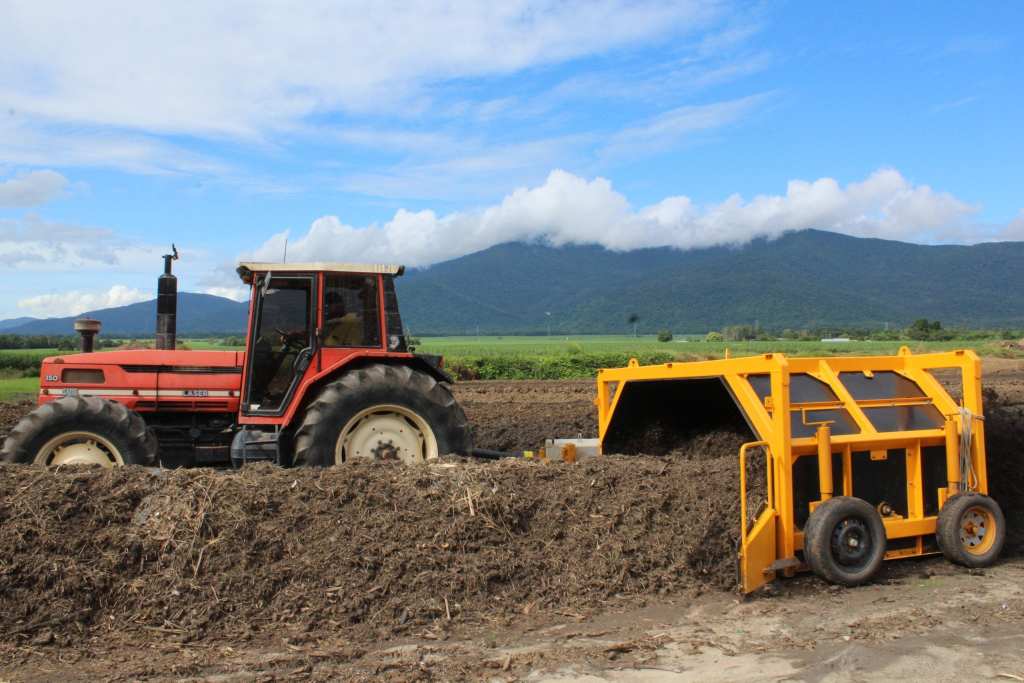Author / Mike Berwick
Over one hundred and thirty cane farmers, agronomists, scientists and advocates attended a two-day Regenerative Cane Farming Forum in Cairns this week. Attendees came from all cane growing districts, including a strong contingent from Mossman. They included some of the most progressive farmers at the forefront of developing and trialling new practices focussed on restoring the biological activity in their soils, commonly referred to as soil health.
- Progressive cane farmers begin the long journey of restoring soil health
- Healthy soil builds resilience to pathogens, holds more water, reduces water logging, needs less added nutrients, reduces the loss of nutrients from the soil and sequesters carbon
- It is the innovation of progressive farmers globally that will figure how to grow food without degrading soils and landscapes…. and play a major role in reversing climate change
IN the opening session, organiser, cane farmer and advocate of Regen Cane, Michael Waring from Ingham, announced the impending formation of the Australian Regenerative Cane Farming Network that will facilitate farmers sharing knowledge and building expertise.
Most farmers’ focus is on soil health because this reduces costs and inputs like tillage, fertiliser and pesticides. Healthy soil builds resilience to pathogens, holds more water, reduces water logging, needs less added nutrients, reduces the loss of nutrients from the soil, and sequesters carbon.
Soil health became a focus for the cane industry following outcomes of the “Sugar Yield Decline Joint Venture”. This was a collaboration among research institutions, which concluded that declining soil health was the cause of ongoing yield decline, despite improved cane varieties, and all the latest agronomic advice on fertilisers, herbicides, pesticides and practices.
Field trips also examined ecosystem repair and examples of the amazing work led by cane farmers in the Mulgrave Landcare Group. Over 30 years of work by these farmers has visibly and ecologically transformed the landscape. Practices include revegetating waterways, retiring marginal land and re-establishing wetland. A separate story on this topic will follow.
Back to soil health.
Restoring the health of soil degraded by years of monoculture and excessive tillage, excessive fertilising and pesticides, is a vision shared by all in attendance. Working towards achieving this goal is gaining increased traction in the industry generally. But getting there is not easy. There is no silver bullet. And it takes time, so transition is not an overnight job.
Improving soil health will maximise diversity in soil biology leading to improvements in:
- converting atmospheric Nitrogen (N) to plant available N (reducing need for added N fertiliser)
- compete with and minimise pathogens that dominate in degraded soils under monoculture crops (reducing the need for pesticides)
- build soil organic matter, the vital component of topsoil
- improve soil structure, drainage and water holding capacity
- sequester carbon
- builds soil from mineralised parent material releasing otherwise unavailable nutrients essential to plants like phosphorous
Some measures taken to improve soil health are widely endorsed in the cane industry:
- GPS (Global Positioning System) controlled traffic so there is no driving or compaction of the growing beds. This means:
- Converting all equipment – harvesters, tractors, planting and tillage – to the same wheel spacings to make “permanent beds”
- Having a GPS transmitter, either on farm or shared among farmers to ensure that year on year the permanent beds are not compacted by heavy machinery
- All implement wheels travel on the same wheel tracks which become hard and compacted while the soil between is not driven on or compacted
- Laser levelling of paddocks to ensure drainage and no ponding that leads to water logging
- Mixed species fallows (cane is replanted, usually every five years)
- Planting a wide diversity of legumes and other species like sunflowers, soy bean, cowpeas, lab-lab and sun hemp rapidly increases soil organic carbon and diversity of soil micro-organisms in the fallow year
- Minimal or zero till:
- Some growers have reached the point in soil health where they plant either the cane or fallow crop directly into the ground with no pre-till
- Many growers are practicing “zonal tillage” which just till the “zone” into which the cane is planted to get the fine tilth of soil needed for a good “strike” from the planted cane stalks
- Cane is planted as “billets”, cane stalks cut to short lengths which “strike” from the nodes

The legume fallows, relatively new in some cane districts, and once discouraged by mills because it meant less cane to crush, mean that Nitrogen fertiliser may not be needed for the first cane harvest, and often less so in the second year.
Because a diversity of cash or fallow crops mixed with an animal rotation is needed to build and maintain soil health, the challenge is difficult in cane. The reason is that for at least five out of every six years, cane is a monoculture crop. “Plant” crops deliver the best yield in the first harvest and usually decline and so are replanted, every five years or so.
Some farmers are therefore trying companion species growing with the cane, at the same time, as well as their fallow mixed species cover crops, again sunflowers and legumes.
Others are making and applying compost. One farm we visited made their own compost from a mix of biosolids, from the Cairns sewerage treatment plant, shredded vegetation/green waste, mill mud and legume tops harvested from their fallow cover crop, making a lively brew that gets hot enough to kill unwanted pathogens and weed seeds. They applied this at about 35 tonnes/ha in their cane plant crop and the farmer, Chris Rossi, said the compost “gave back to the soil for years”.
Using compost has several advantages: it makes up for the fact there are no animals in rotation adding faeces with valuable nutrients and microbes as occurs in nature; the nutrients in compost are held in the organic matter and is available to plants, so are not lost.


Building soil health takes many years. It is not an overnight fix. The bacteria, invertebrates, vertebrates and fungi in healthy soils make up an enormously complex ecosystem – anecdotally, it is said that we know more about outer space than we do about soil biodiversity.
These regenerative farmers are at the forefront of change. Methods to improve, measure and monitor soil health are in their infancy. It is the innovation of progressive farmers globally that will figure how to grow food without degrading soils and landscapes and play a major role in reversing climate change. Given a chance, farmers can be amazingly innovative – they are a fine example of practitioners leading science, and the science catching up later to find out the ‘whys’ and ‘wherefores’.
We should all be grateful for their innovation, skills and long hours. As one farmer said,” regenerative agriculture changes farming from boring to exciting”.







[…] farmers are becoming increasingly familiar with some of these practices. Recent forums such as Regen Cane advocating Regenerative Agriculture, and Project Catalyst, a World Wildlife Fund/CocaCola […]
Again – we are an region that is defined by cane farming – and anything that undoes the many decades of soil mistreatment should be actively encouraged. But in the future we re going to be experiencing – we should start weaning at least some of our land away from cane – we should be encouraging a greater diversity in our farming.
https://en.wikipedia.org/wiki/Market_garden
We are still firmly stuck in a “Business As Usual” mindset. We have a growing population in the Port Douglas/Mossman region – which, when fossil fuels (think transport costs) start becoming a limiting issue, need affordable locally produced food. OK we don’t have the basaltic soils of the tablelands, but using composting and other techniques, they can be as productive. We really HAVE to change our mindsets!